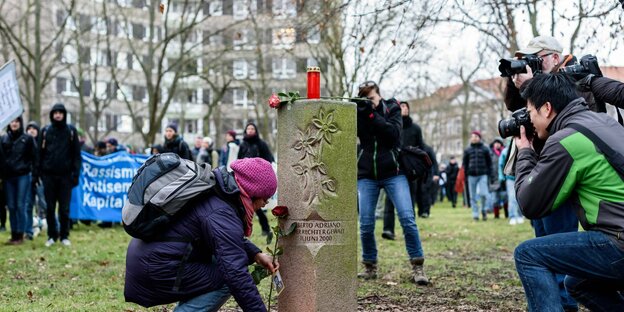The “Nazi-Free Dessau” alliance has achieved small successes. But activists cannot rest. Member Antje Tietz on her commitment.

Protester at the Dessau memorial to Alberto Adriano 2018 Photo: Markus Heine/imago
taz: Ms. Tietz, “Dessau Nazifrei” was founded in 2014. How close are you to Nazi-free Dessau?
Antje Tietz: At that time, what we mainly wanted was to stop the so-called “funeral marches”; really, stop them. It was about the bombing of Dessau by the Allies on March 7, 1945. We wanted to go beyond civil protests and block and prevent these marches. 400 Nazis attended the weddings. Well: at least they haven't marched for a few years.
But are there still neo-Nazis and right-wing extremists in Dessau?
Unfortunately yes.
Dessau-Roßlau is the third largest city in Saxony-Anhalt and currently around 80,000 people live there. About 200 people attended a demonstration against the AfD in January. What did you think of that?
He is 55 years old, has a family history of anti-fascists and has been active against the Nazis since the fall of the Wall. From 1992 to 1998 he was a member of the state parliament of Saxony-Anhalt. Today he is part of “Dessau Nazifrei”.
So we were excited. We only thought about it on Saturday and we mobilized on Monday. But we couldn't print anything that quickly, so we made phone calls and handed out little cards. We wanted to reach radical Antifa as well as ordinary people who don't like the AfD. By Dessau standards, 200 people were a lot. Students, officials and queer people from the city came.
On April 27 you recorded another demo titled “No more 1932”. What do you mean by that?
On April 24, 1932, the Nazis won 40 percent of the state elections in what was then the Free State of Anhalt. Many speak of a “fascist takeover.” But they were elected, and in Anhalt in 1932, not just 33. We want to draw attention to this by going to historical places and telling what happened shortly after the elections.
That?
There were prohibitions, for example, the colors of the Weimar Republic were no longer allowed to be hoisted and the Bauhaus was closed. Then-Prime Minister Alfred Freyberg (NSDAP) issued a school decree that was supposed to place “Germanism” at the top of the curriculum, and arrests followed. We want to make it clear how quickly this can happen. We've been trying to do it since last year, and I'm horrified that some people react defensively and say, “It won't be that bad.” But we can't feel safe. Things got bad then.
Can you tell us what the atmosphere was like in Anhalt in 1932?
In the city archives I heard about Gerhart Seger, who was the chief cyclist of the Volksblatt for Anhalt and as a social democrat in the Reichstag. At the time he wrote: The National Socialist movement is already in decline in the big cities and this will continue once they are in government. There they will be disenchanted. Apparently he also thought at the time that it wouldn't be so bad. He was wrong. A little later Seger was arrested and that Volksblatt was banned for ten days. He subsequently opposed the Enabling Law and was sent to the Oranienburg concentration camp in 1933.
Can this really be compared to the current situation?
We still have advantages today compared to then. That the judiciary is independent, for example, or that the workers do not persecute the AfD. I still think some parallels can be drawn.
But we are walking a tightrope if we directly link the AfD to the Nazi dictatorship. Couldn't this also trivialize the Nazi dictatorship?
Yes, this is a very controversial topic. I think that a large part of the party is fascist and the other part is naive. The NSDAP should not be trivialized. But I don't think I will. The AfD argues in a nationalist, racist and misogynistic way.
Although the marches no longer take place, today there are other neo-Nazis in Dessau, for example from the small Third Way party. How are right-wing extremists present in the city?
Different. Last week I reported swastika graffiti to the police three times. Nazi stickers are often posted in Dessau-Süd. Even during civil protests, well-known neo-Nazis stand by and take photographs. They provoke and threaten. There are always little pushes.
What motivates you to keep going?
If you've studied history, you know this can happen again. And that must not happen again. My grandfather was imprisoned in the Buchenwald concentration camp. I have to keep doing this, he would be happy if he didn't have to do it. And my campaign colleagues feel the same. We could only stop if such inhuman attitudes no longer existed.
Since 1992, you were a PDS deputy in the state parliament of Saxony-Anhalt for six years. Why are you no longer active in the party and are you now affiliated with Dessau Nazifrei?
You are right, I am still a member of the left, but I am no longer active. I don't have enough anti-fascist things happening locally. I currently see my role in the alliance. I want to work with everyone in the fight against the Nazis, with historians, people on the left, the Greens or the CDU. Even if I don't think some of their policies are right, we have to unite against the Nazis.
